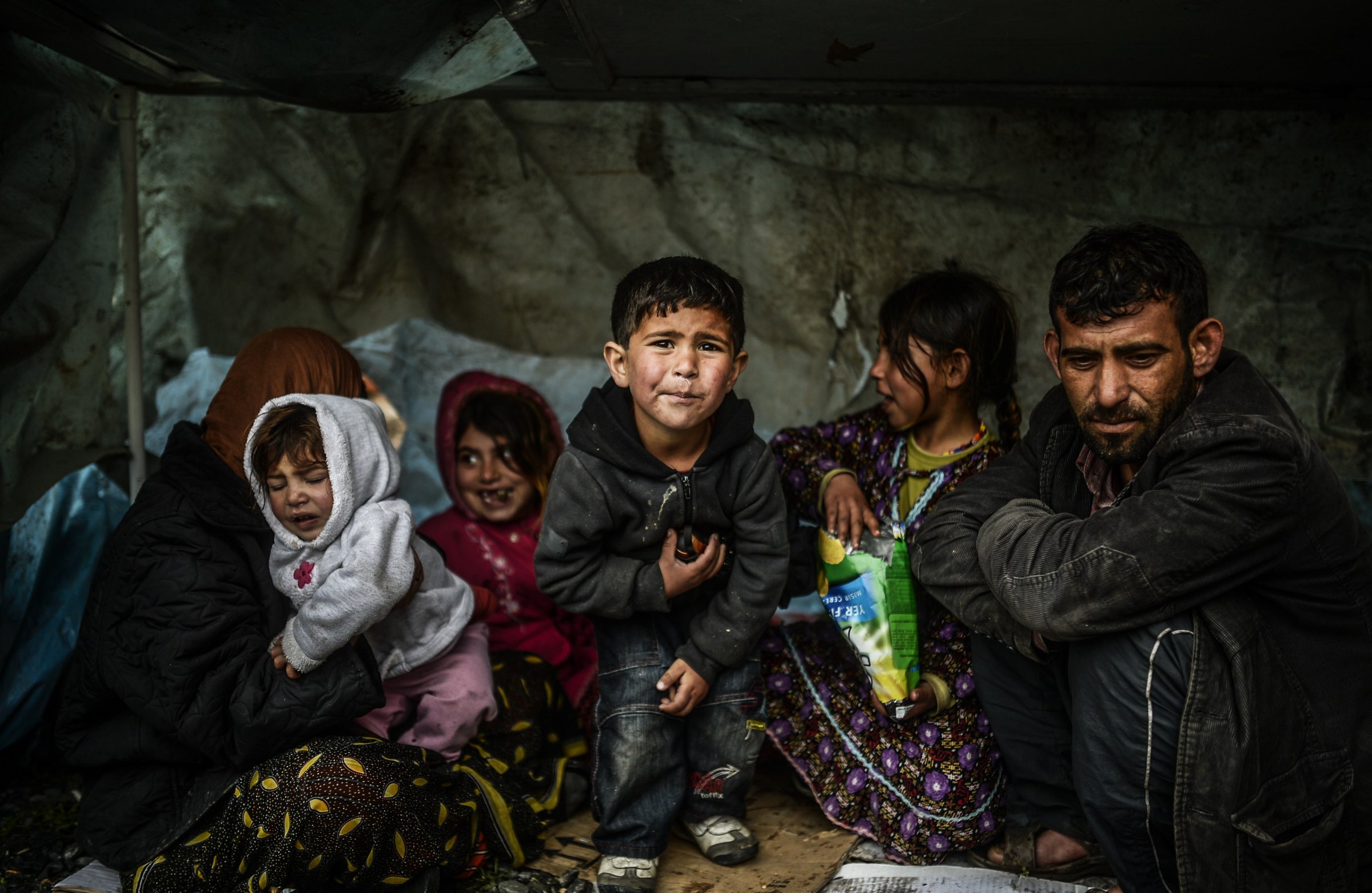
“We had work, we had a big home, four rooms, two floors,” Farid says, his wife, Ghada, and children sitting beside him. “Ghada used to make carpets. We lived side by side with a few other families. It was crowded, but not like this.”
“This” is what passes for Farid’s new family home: a small room in a dank, filthy basement in Eminonu, an Istanbul neighborhood, packed with two carpets, a single light bulb, four wafer thin mattresses and a shelf. Nine other Syrian families live in the same building, crammed into two floors. Farid, 27, a farm laborer, arrived here last summer, he says, his Aleppo neighborhood engulfed by fighting between anti-regime rebels and government forces, his old house devastated beyond repair.
Work in Istanbul hasn’t been easy to find. Occasionally, the odd construction job comes along, paying 20-30 lira ($10-15) per day. Ghada and the kids spend their days panhandling in the nearby tourist district. “We can afford food,” says Farid, “but not medicine, not diapers.”
For Turkey, the trickle of refugees that began in late April 2011, soon after the start of violence in Syria, has turned into a flood. At the start of 2013, the country was home to 171,000 officially registered Syrians. Today, that number has climbed to 736,000, according to Turkey’s Disaster and Emergency Management Presidency. By the end of the year the government expects to receive another 750,000 refugees.
Turkey’s border camps and container cities, accommodating about 220,000 Syrians, have been praised as some of the world’s best. The bulk of the refugees, however, live outside the camps, most of them in large cities, many of them in abject poverty. Officially, they number about 500,000. Some estimates put the figure at close to a million. A recent report by the International Crisis Group (ICG), a think tank, underscored their plight: 86 percent of Syrian children living outside the camps have no access to education. Many of them, much like their parents, are forced to work illegally with no social security and often for less pay than Turks, or to beg.
Amidst reports of rising crime and sectarian tensions in border areas, as well as competition for jobs, the refugees have started to wear out their welcome. In a January poll, 55 percent of Turks said their country should close its doors to fleeing Syrians. Of these, 30 percent insisted that it should send back those already here. Thus far, the mainstream political parties have not taken the bait, declining to indulge in any populist, anti-immigrant rhetoric.
Though reports of open hostility are relatively few and far between, the potential for unrest is growing. Last May, after a car bomb attack in a Turkish town killed more than 50 people, angry locals clashed with Syrian refugees, sending hundreds fleeing.A man in Gaziantep, a large city near the border, recently told ICG analysts his neighbors were “sleeping with guns under their pillows” out of fear that Syrians would break into their houses. On Wednesday in Ankara, the country’s capital, a number of people were injured when locals set fire to a building inhabited by refugees after a street brawl.
Turkey never expected the war in nearby Syria to play out as it has. Three years ago, as peaceful protests gave way to an armed rebellion and as the first of the fleeing Syrians arrived, officials in Ankara predicted that Bashar Assad’s days were numbered. Today, with the war having claimed 150,000 lives, Assad still in power, and with no end to the fighting in sight, the government of Recep Tayyip Erdogan is facing a bitter reality: the refugees might be here to stay.
Ankara, says Kemal Kirisci, director of the Turkey Project at the Brookings Institution and the author of an upcoming paper on the refugee crisis, never had a long-term strategy for integrating the Syrians. To this day, he says, “these challenges are being addressed on an incremental basis.” Without a comprehensive plan to provide them with adequate shelter, food, education and work, he warns, Syrians living outside the camps risk turning into a permanent underclass.
It won’t be for lack of trying. Officials here point out that the government has extended healthcare access to all Syrians in Turkey, that work has begun on a facilitated employment system, and that a plan to put more Syrian children in school is in the pipeline. But they draw the line at citizenship. “Naturalization is not in our agenda,” says one. Foreign aid, he adds, “has been below all expectations.” Of the $3.5 billion that Turkey claims to have spent on helping the refugees, less than $200 million came from outside donors.
Inside Farid’s ramshackle Istanbul house, an older relative holds a child in one arm, an empty pack of pills in the other. The boy is visibly sick, his nose running, one of his eyes dimmed by fever, the other swollen shut. A fetid stench fills the air, so thick it seems to slow down the flies haloing above Farid and his family. One of the kids has diarrhea, says Ghada. She tucks her youngest son under her robe to breastfeed him.
I ask Farid if he ever regrets coming here. “No,” he says. “We’ve nowhere to go back to.”
More Must-Reads from TIME
- Why Trump’s Message Worked on Latino Men
- What Trump’s Win Could Mean for Housing
- The 100 Must-Read Books of 2024
- Sleep Doctors Share the 1 Tip That’s Changed Their Lives
- Column: Let’s Bring Back Romance
- What It’s Like to Have Long COVID As a Kid
- FX’s Say Nothing Is the Must-Watch Political Thriller of 2024
- Merle Bombardieri Is Helping People Make the Baby Decision
Contact us at letters@time.com